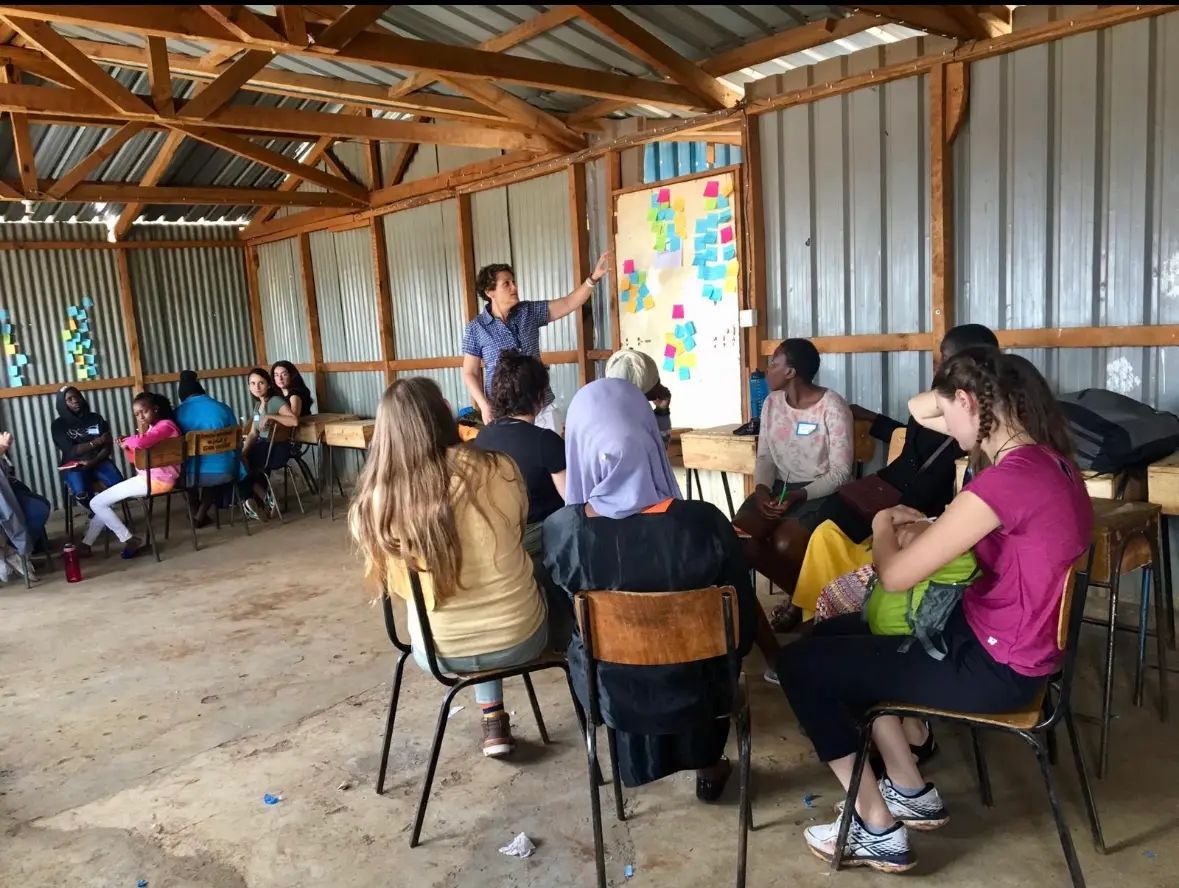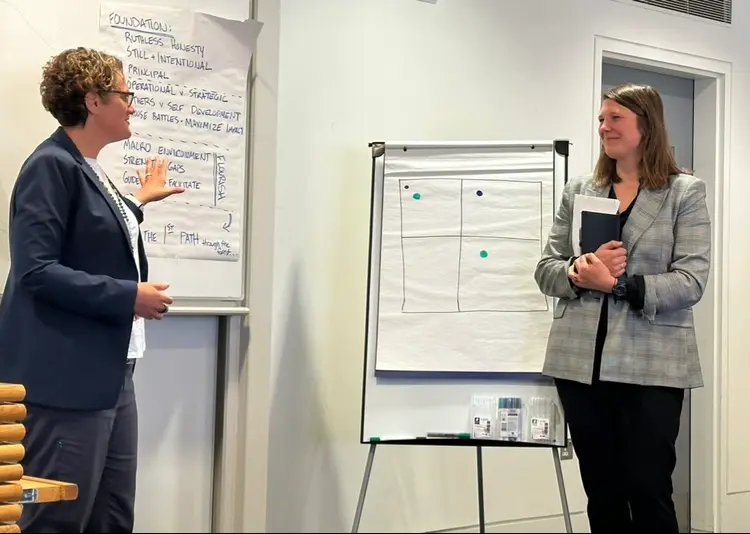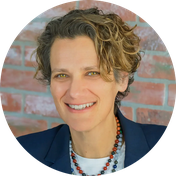
Close
result
PROFILE
Dwelling on the edge of discomfort
Dwelling on the edge of discomfort
Rhiannon Farr
6 min read

Hope Wisneski combines her role as a chief of staff with running an external consultancy. Interview by Rhiannon Farr.
What does being a chief of staff entail in a higher education setting? How did this lead you to the creation of HEW Strategies, LLC?
Serving as a CoS at my alma mater, where I earned my Master of Social Work (MSW), presented a compelling opportunity to collaborate with an innovative principal and transform business for a graduate education programme. Like all industries, higher education must respond to market expectations and deliver an affordable product while remaining relevant in an increasingly digitalised marketplace. With a dynamic team of change makers, our school successfully introduced an online degree, resulting in a remarkable achievement: doubling both revenues and staff, while simultaneously tripling the student body in less than two years.
As the CoS, I led the operational change by working closely with our leadership team and our dedicated workforce. I worked side by side with department leaders to optimise the placement of existing and new staff while creating multiple internal advancement opportunities. Amid the rapid growth, we prioritised efficiency, effectiveness and co-creating a positive workplace culture. Working through this extensive change initiative marked a period of profound personal development for me. Following a career spent in integrator roles across industries, I found that collaborating with a visionary leader in an academic environment provided me with the freedom to experiment, take risks, and engage in a learning about systems change that was entirely fresh to me.
One attraction of higher education is the tuition benefit. In my second year of a six-year tenure, I enrolled in the on-campus Executive MBA programme. Balancing full-time school with a demanding job and family life was challenging, but fruitful. The experience allowed me to elevate my leadership role in a unique way, combining social work values with my recently acquired business acumen.
Following the completion of my MBA, I founded a consulting practice to assist leaders and teams across industries develop roadmaps, achieve their goals, and prioritise their people. Responding to post-pandemic challenges, I addressed the need for updated business plans, hybrid workplace norms, and the recreation of a culture of belonging – challenges I had previously navigated in my role. HEW Strategies, LLC has developed into an incubator for me to test ideas, refine custom management learning tools, and support my passion for coaching emerging national leaders. I now specialise in working with new and developing leaders in service-driven organisations who are hungry to learn to advance their management skills for our rapidly changing world. Middle managers are constantly asked to do more with less. My LLC helps organisations strategically invest in the talent pool most valuable to retain in today’s marketplace.
The opportunity to contribute to organisations by holding both internal leadership roles while simultaneously offering external consulting has enhanced my leadership skills. Neuroscience underscores the constant pattern-seeking nature of our brains, craving the comfort of the status quo. My LLC helps keep me, and the businesses I work with, on the edge of discomfort, leaning into the next opportunity to achieve results and have some fun. I feel inspired to remain creative and relevant while addressing the ever-evolving needs of today’s business landscape.

Were there any standout experiences (good or bad) that helped shape how you lead as a chief of staff?
Navigating the leadership challenges posed by COVID was an arduous yet invaluable journey. In the face of abrupt shifts away from traditional in-office work and the unimaginable fear, confusion and suffering endured by many, our ability to shape our response as leaders became a pivotal factor as we worked to centre the needs of our workforce. During the pandemic I learned the transformative power of knowing employees on a personal level and understanding their unique needs and stories so that accommodations were finely tuned to match individual and team needs. Moreover, the experience underscored the importance of recalibrating the balance between efficiency and process. Rather than adhering to the rapid decision-making process of the past, COVID demanded a shift toward heart-centred leadership, emphasising deep listening skills and a slower decision-making practice. Through this period, I evolved as a leader, forever changed by the profound lessons gleaned mostly from the challenges, and some from the triumphs, of serving on a leadership team through the complexities of the pandemic.
Participating in the Oxford on-campus certificate programme with CSA was another truly defining moment in my professional journey as a CoS. Engaging with colleagues from diverse corners of the globe, we forged lasting connections that have transformed into a network of colleagues and friends. The programme not only facilitated personal growth, but also provided a foundation in an integrated approach to leadership. It underscored that leadership extends beyond the tasks that we execute; it is equally about how we navigate the work and guide our teams. Under the guidance of CSA and Oxford’s Andrew White, we worked through the intricacies of leading and influencing transformation and systems change, while learning the significance of mindfulness and the power of having a little fun. Through a blend of large and small group experiential workshops, we explored innovative ways to bring value to our teams and organisations. Being a part of the Oxford experience was incredibly special.
Although you haven’t been in the chief operating officer position for long, it’s still impressive that you’re the first one. Have there been any hurdles/things to overcome as a result?
Entering a new professional role is always challenging, though I am optimistic about swiftly contributing value, despite facing a steep learning curve in terms of the industry, relationships with staff and donors, and understanding the office culture. Leveraging my recent experience as a CoS in higher education and my enhanced skills acquired through CSA, I feel prepared to serve as my organisation’s first COO.
I am confronted with three primary hurdles that call for my attention. The first involves quickly building relationships. Much like my experience as a CoS in higher education, the organisation I’ve joined has undergone rapid growth, expanding its staff threefold over recent years. I am approaching this new leadership role with a keen awareness of the impact change has had on the entire organisation, particularly on middle management and senior leaders. To build relationships quickly, I am focusing on listening at scale and fostering a collective grounding in our shared defined purpose, which is easy because of the incredible mission of the organisation. I hope to bring a fresh perspective to organisational change and inject humour and honesty to foster candid exchanges and build lasting trust.
A second hurdle I am navigating involves immersing myself in the office culture while collaboratively shaping new systems to guide change at an optimal pace all within the framework of fostering an environment of psychological safety. Many business journals emphasise the critical role of staff feeling at ease to ask questions, take risks, and express genuine concerns for teams to operate with agility and effectiveness. Whether in the CoS or COO role, and regardless of the industry, guiding the evolution of our staff is imperative for organisational transformation and continued relevance. In my capacity as a leader, I have the responsibility of not only filtering and translating information, but also addressing internal stress and challenges. Echoing the teachings of Andrew White at Oxford, our workforce has the right to ‘be’ and ‘belong’. Nurturing a culture that celebrates belonging empowers individuals to then ‘become,’ both as individuals and as part of a cohesive team.
The third challenge involves leading the development of the organisation’s upcoming strategic plan. The task not only demands the construction of the plan itself but also envisions the future and then strategically works backwards to craft a comprehensive roadmap for execution. While understanding the macro context of our industry poses its own set of challenges, the true complexity lies in establishing strategic alignment as we lay the foundation for the plan. Jonathan Trevor, a faculty member from our CSA Oxford experience, challenged us to contemplate organisational effectiveness by emphasising the alignment of purpose, people, and structure in our planning processes. Formulating purpose-driven goals with clear measures will pave the way for our teams to achieve a successful future. Navigating the strategic planning process in my new role promises to be a challenging yet enriching learning experience during my onboarding journey.
I hold sincere gratitude to CSA for the lessons and experiences gained as a CoS as well as for the support extended to me in my new role as a COO. I am excited about continued learning opportunities, particularly from the outstanding staff and faculty at CSA. I also look forward to continued engagement with an international community of talented colleagues.

Hope Errico Wisneski, LCSW, MBA
Chief Operating Officer at Raise the Future and Principal of HEW Strategies, LLC
Hope is Chief Operating Officer at Raise the Future, a US-based child welfare organization. She is also the principal of HEW Strategies, LLC, and serves as an adjunct faculty at the Graduate School of Social Work, Daniels College of Business EMBA program, and Daniels College of Business Executive Education at the University of Denver. She is a 2023 Chief of Staff Association Fellow and a CSA Certified Chief of Staff.
Prior to serving as a Chief of Staff and Associate Dean at the University of Denver, Hope worked with the Human Rights Campaign in Washington DC, where she served as the senior regional field director working across the US West to mobilise grassroots advocacy on behalf of federal and state legislative and electoral priorities. Prior, she served as a national program officer for the Gill Foundation, where she worked across the US with nearly 100 state and local advocacy organizations in 38 states to develop, fund, and implement plans to advance pro-equality change. Earlier in her career, Hope served as the deputy executive director of The Center on Colfax where she oversaw daily operations and supervised all programs for the largest LGBTQ+ community center in Colorado. Hope’s former experience includes various client service, management, and clinical roles in Colorado’s nonprofit, juvenile justice, and mental health agencies.

Author Bio
Rhiannon Farr
Assistant Editor
rhiannon.farr@csa.org
Rhiannon is an experienced editor and communications specialist, and has been working with the Chief of Staff Association since October 2023. She holds a BA(Hons) in English Literature from Cardiff University and is currently studying an MSt in Literature and Arts at University of Oxford.








